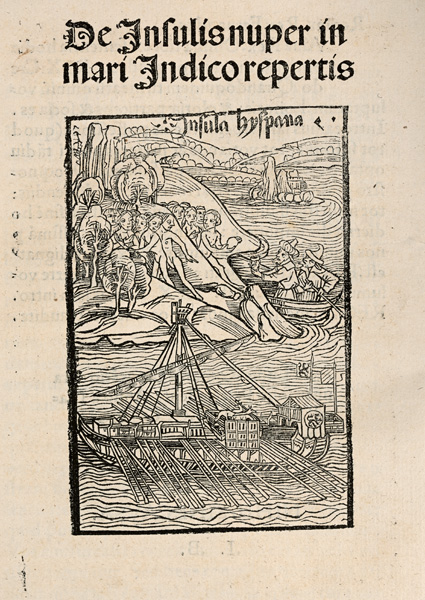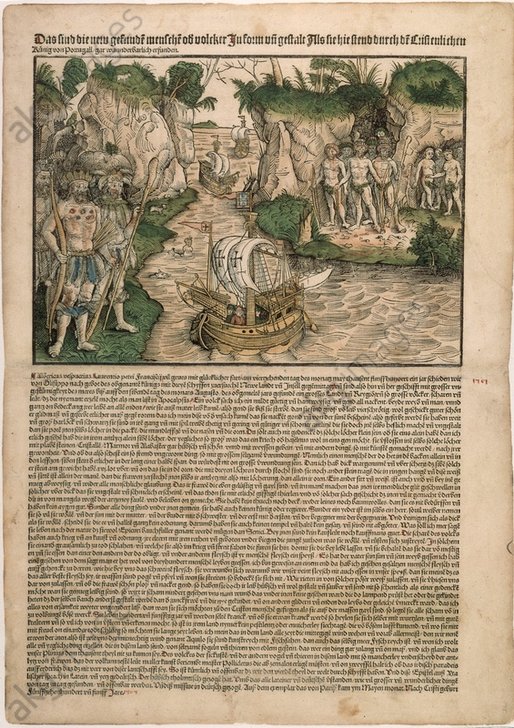Week 8. New Worlds and the Trope of Discovery
The trope of "discovery", along with related notions such as exploration, path-finding, and pioneering, has been a central frame through which to understand travel and its implications particularly in the Euro-American tradition from the early modern period onwards. Nowhere was this trope more powerful than in relation to the Columbian "discovery" of the "New World", which rendered the Americas as a blank slate to be inscribed and appropriated. This seminar focuses on this rhetorical framing and its long-term material and geopolitical consequences, and asks how European travel accounts can offer a lens onto Amerindian actors and perspectives.
Core Readings
Nicolás Wey Gómez, The Tropics of Empire: Why Columbus Sailed South to the Indies (Cambridge, MA: MIT Press, 2008), 'Introduction', pp. 3-57. Link.
John Rennie Short, Cartographic Encounters: Indigenous Peoples and the Exploration of the New World (London: Reaktion Books, 2009), pp. 9-31, 47-56. Link.
Primary sources
Peter C. Mancall (ed.), Travel Narratives from the Age of Discovery: An Anthology (Oxford: Oxford University Press, 2006), Documents 15 (Letter of Christopher Columbus, 1493) and 16 (Mondus Novus by Amerigo Vespucci, 1504). Link.
Richard Hakluyt, Principal Navigations Voyages Traffiques and Discoveries of the English Nation [3 vols. London: 1598-1600] (12 Vols. Glasgow: 1903). Browse the table of contents of volume 7 and volume 8 and select a source to read in detail.
- Why did latitude matter in the geographical thinking of late medieval Europe? How did it shape Columbus' expeditions and their aftermath?
- Wey Gómez argues that "the geopolitical paradigm that Columbus and his contemporaries inherited from classical antiquity remains alive and well in the West." (p. 57). Do you agree with his claim? In what ways is this geopolitical paradigm manifested?
- Short situates his work in relation to three wider debates. What role does travel play in each of them and to what extent do you find them useful for thinking about travel?
- Short suggests that “with the benefit of hindsight and a sensitive postmodern ear, we can detect the contribution of the Native Americans embedded in the explorers’ own journals and narratives.” (17). How could you do so and what are the challenges? Can you apply this to the letters by Columbus and Vespucci?
- Which tropes about the “New World” are promoted by Columbus and Vespucci? Why do they matter?
Further Reading
Abulafia, David, The discovery of Mankind: Atlantic Encounters in the Age of Columbus (New Haven: Yale University Press, 2008).
Bravo, Michael, 'Indigenous Voyaging, Authorship, and Discovery', in: Adriana Craciun and Mary Terrall (eds.), Curious Encounters: Voyaging, Collecting, and Making Knowledge in the Long Eighteenth Century (Toronto: University of Toronto Press, 2019), pp. 71-112. Link.
Casale, Giancarlo, The Ottoman Age of Exploration (Oxford: Oxford University Press, 2010). Link.
Casale, Giancarlo, 'Did Alexander the Great Discover America? Debating Space and Time in Renaissance Istanbul', Renaissance Quarterly 72.3 (2019), pp. 863-909. Link.
Cook, Ramsay (ed.), The Voyages of Jacques Cartier (Toronto: Toronto University Press, 1993). Link.
Douglas, Bronwen, 'Imagined Futures in the Past: Empire, Place, Race, and Nation in the Mapping of Oceania', in: Warwick Anderson, Miranda Johnson and Barbara Brookes (eds.), Pacific Futures: Past and Present (Honolulu: University of Hawai'i Press, 2018), pp. 131-154. Link.
Forbes, Jack D., The American Discovery of Europe (Urbana: University of Illinois Press, 2007). Link.
Fuller, Mary C., Remembering the Early Modern Voyage: English Narratives in the Age of European Expansion (New York: Palgrave MacMillan, 2008). Link.
Grafton, Anthony, with April Shelford and Nancy G. Siraisi, New Worlds, Ancient texts: The Power of Tradition and the Shock of Discovery (Cambridge, MA: The Belknap Press, 1992). Link.
Greenblatt, Stephen, Marvelous Possessions: The Wonder of the New World (Chicago: University of Chicago Press, 1991), Ch. 3. Link.
Horodowich, Elizabeth, The Venetian Discovery of America: Geographic Imagination and Print Culture in the Age of Encounters (Cambridge: Cambridge University Press, 2018). Link.
Northrup, David, Africa's Discovery of Europe, 1450-1850 (Oxford: Oxford University Press, 2014). Link.
Pagden, Anthony (ed.), Facing Each Other: the World's Perception of Europe and Europe's Perception of the World (Aldershot: Ashgate, 2000).
Paine, Lincoln, 'Rediscovering the Age of Discovery', in: Claire Jowitt, Craig Lambert, Steve Mentz (eds.), The Routledge Companion to Marine and Maritime Worlds 1400-1800 (London: Routledge, 2020), pp. 50-66. Link.
Paul, Heike, The Myths That Made America: An Introduction to American Studies (Bielefeld: Transcript Verlag, 2014), Ch. 1: 'Christopher Columbus and the Myth of ‘Discovery’'. Link.
Pigafetta, Antonio, Theodore J. Cachey Jr. (ed.), The First Voyage around the World (1519-1522): An Account of Magellan's Expedition (Toronto: University of Toronto Press, 2007). Link.
Pope, Peter, The Many Landfalls of John Cabot (Toronto: University of Toronto Press, 1997). Link.
Rubiés, Joan-Pau, 'Futility in the New World: Narratives of Travel in Sixteenth-Century America', in: Jas Elsner and Joan-Pau Rubiés (eds.), Voyages and Visions: Towards a Cultural History of Travel (London: Reaktion Books, 1999), pp. 74-100. Link.
Schlegel, Johannes, 'Walter Ralegh, The Discoverie of the Large, Rich, and Bewtiful Empyre of Guiana (1596)', in: Barbara Schaff (ed.), Handbook of British Travel Writing (Berlin and Boston: De Gruyter, 2020), pp. 145-160. Link.
Seed, Patricia, Ceremonies of Possession in Europe's Conquest of the New World, 1492-1640 (Cambridge: Cambridge University Press, 1995). Link.
Shellam, Tiffany, Maria Nugent, Shino Konishi and Allison Cadzow (eds.), Brokers and boundaries: Colonial Exploration in Indigenous Territory (Acton: ANU Press, 2016). Link.
Tymowski, Michal, 'African perceptions of Europeans in the early period of Portuguese expeditions to West Africa', Itinerario 39.2 (2015), pp. 221-246. Link.
Warkentin, Germaine, Critical Issues in Editing Exploration Texts (Toronto: University of Toronto Press, 1995). Link.
Willingham, Elizabeth, Mythical Indies and Columbus's Apocalyptic Letter: Imagining the Americas in the Late Middle Ages (Eastbourne: Sussex Academic Press, 2015). Link.


.
